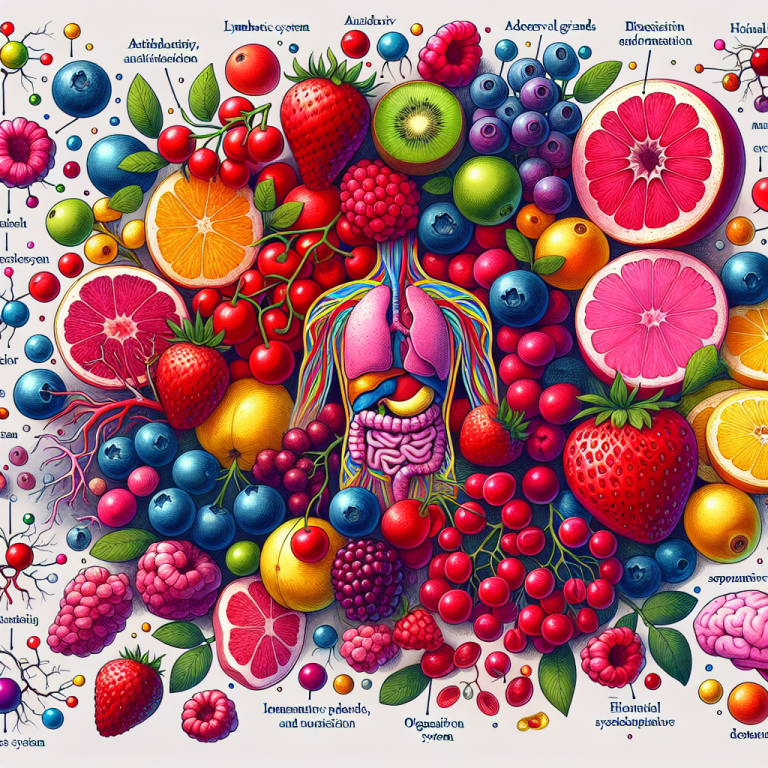Berries
Berries are a vibrant and diverse group of fruits that encompass a wide range of flavors, colors, and nutritional profiles. They are renowned for their rich antioxidant content, potent anti-inflammatory properties, and numerous health benefits. When it comes to supporting the lymphatic system, adrenal glands, digestive system, and blood health, berries offer a plethora of therapeutic actions that contribute to overall well-being.

The lymphatic system plays a crucial role in immune function, toxin removal, and fluid balance in the body. Berries, particularly dark-colored varieties like blueberries, blackberries, and raspberries, are rich in antioxidants such as anthocyanins, flavonoids, and vitamin C. These compounds help to neutralize free radicals and reduce oxidative stress, thereby supporting the health of lymphatic vessels and nodes. Additionally, the high fiber content in berries aids in promoting regular bowel movements, which is essential for eliminating toxins and waste products from the body, further supporting lymphatic function.

The adrenal glands are responsible for producing hormones such as cortisol, which plays a crucial role in managing stress responses and regulating metabolism. Chronic stress can lead to adrenal fatigue or dysfunction. Berries contain adaptogenic compounds like flavonoids and polyphenols that help the body adapt to stress and promote adrenal health. Additionally, the vitamin C content in berries supports adrenal function by aiding in the synthesis of cortisol and other adrenal hormones. Consuming berries as part of a balanced diet can help mitigate the negative effects of stress on the adrenal glands.

Berries are a rich source of dietary fiber, particularly soluble fiber, which plays a vital role in digestive health. Fiber helps to promote regular bowel movements, prevent constipation, and support the growth of beneficial gut bacteria. This, in turn, contributes to a healthy digestive system by improving nutrient absorption and reducing the risk of digestive disorders such as irritable bowel syndrome (IBS) and diverticulitis. Furthermore, berries contain natural compounds like ellagic acid and quercetin, which possess anti-inflammatory properties that help alleviate symptoms of gastrointestinal inflammation.


Maintaining healthy blood circulation and blood sugar levels is essential for overall health and vitality. Berries, especially those with deep colors like strawberries, cherries, blackberries, and grapes, are packed with anthocyanins and other phytonutrients that promote cardiovascular health. These compounds help to improve blood flow, reduce inflammation, lower blood pressure, and protect against oxidative damage to blood vessels. Additionally, the fiber content in berries helps to slow down the absorption of sugar in the bloodstream, which aid in regulating blood sugar levels and reducing the risk of insulin resistance and type 2 diabetes.

From supporting cognitive function to protecting against neurodegenerative diseases, berries are rich in antioxidants, vitamins, and phytochemicals that play crucial roles in maintaining the health and integrity of the nervous system.
Antioxidant Protection: Berries, particularly darker varieties like blueberries, blackberries, and raspberries, are packed with antioxidants such as anthocyanins, flavonoids, and vitamin C. These antioxidants help neutralize free radicals, which are unstable molecules that can damage cells in the brain and nervous system. By reducing oxidative stress, berries protect neurons from damage and support overall neurological health.
Cognitive Function: Several studies have linked berry consumption to improved cognitive function and memory. The antioxidants found in berries have been shown to enhance signaling pathways in the brain, promote neuroplasticity, and protect against age-related cognitive decline. Regular consumption of berries, especially blueberries, has been associated with better memory, attention, and cognitive performance in both animal and human studies.
Neuroprotective Effects: Berries contain various bioactive compounds with neuroprotective properties. For example, flavonoids found in berries have been shown to reduce inflammation and oxidative stress in the brain, which are implicated in neurodegenerative diseases such as Alzheimer’s and Parkinson’s disease. Additionally, certain compounds in berries, such as resveratrol in grapes and strawberries, have been studied for their potential neuroprotective effects against age-related cognitive decline and neurodegenerative disorders.
Mood Regulation: The consumption of berries has also been linked to improved mood and mental well-being. Flavonoids and other bioactive compounds found in berries may exert antidepressant and anxiolytic effects by modulating neurotransmitter levels, reducing inflammation, and promoting the growth of new neurons in brain regions associated with mood regulation. Including berries in your diet will help support mental health and reduce the risk of mood disorders.
Anti-Inflammatory Effects: Chronic inflammation in the nervous system is associated with various neurological disorders, including multiple sclerosis, Alzheimer’s disease, and Parkinson’s disease. Berries possess anti-inflammatory properties due to their high content of antioxidants and polyphenols. These compounds help reduce inflammation in the brain and protect against neuroinflammatory damage, thus supporting nervous system health.
Blood-Brain Barrier Integrity: The blood-brain barrier (BBB) is a protective barrier that regulates the passage of substances between the bloodstream and the brain. Maintaining the integrity of the BBB is essential for protecting the brain from toxins and pathogens. Some studies suggest that the antioxidants and phytochemicals found in berries helps preserve the integrity of the BBB and support its proper function, thereby safeguarding the nervous system from harm.
Ezekiel 47:12 12 And by the river upon the bank thereof, on this side and on that side, shall grow all trees for meat, whose leaf shall not fade, neither shall the fruit thereof be consumed: it shall bring forth new fruit according to his months, because their waters they issued out of the sanctuary: and the fruit thereof shall be for meat, and the leaf thereof for medicine.
In summary, berries offer a myriad of health benefits that support the lymphatic system, adrenal glands, digestive system, blood and nervous system health. Incorporating a variety of berries into your diet will provide essential nutrients, antioxidants, and therapeutic compounds that promote overall well-being and help prevent chronic diseases. Whether enjoyed fresh, frozen, or dried, berries are a delicious and nutritious addition to the diet.
Psalm 19:7-11 7 The law of the Lord is perfect, converting the soul: the testimony of the Lord is sure, making wise the simple.8 The statutes of the Lord are right, rejoicing the heart: the commandment of the Lord is pure, enlightening the eyes.9 The fear of the Lord is clean, enduring for ever: the judgments of the Lord are true and righteous altogether.10 More to be desired are they than gold, yea, than much fine gold: sweeter also than honey and the honeycomb.11 Moreover by them is thy servant warned: and in keeping of them there is great reward.
Are you looking for more resource material for guidance in your journey to optimize your well-being? then you should read:
The Grape Cure By Johanna Brandt
For herbal supplementation:
Berry-oxidants Tea – All1Fitness
Berry-oxidants Capsules – All1Fitness
NOTE: We highly recommend that before using any herbal medications you should consult your health care provider or medical doctor for professional advice.



4 comments
IPTV Ireland
hello!,I like your writing very so much! proportion we keep up a correspondence extra approximately your post on AOL? I need an expert in this space to unravel my problem. May be that is you! Taking a look forward to see you.
All1Fitness
All Praises to the Creator
AdrianaG
You have mentioned very interesting points! ps decent site.Blog monetyze
All1Fitness
All Praises to the Creator